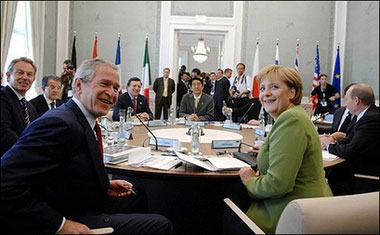Europe
G8 leaders pledge $60B to Africa to fight AIDS
(Reuters)
Updated: 2007-06-08 15:43
 |
Large Medium Small |
Kosovo, Iran
Officials were also tackling an impasse over Kosovo's future late on Thursday, with France pushing a plan to delay a UN vote on the majority ethnic Albanian province's independence in exchange for Russia agreeing not to veto the outcome.
 German Chancellor Angela Merkel (R) and US President George W. Bush pose for a picture prior to start the first working session of the G8 summit leaders meeting in Heiligendamm, Germany. [AFP] |
Officials were also discussing Iran and were likely to confirm plans to back "further measures" - in other words more UN sanctions - against Tehran if it continues to reject UN demands to halt uranium enrichment in its nuclear programme.
The United States has accused Iran of having secret plans to build nuclear weapons. Tehran says its nuclear programme is solely for power to benefit its economy.
G8 leaders at the summit agreed on Thursday to pursue "substantial" cuts in greenhouse gases to combat global warming.
On Thursday, G8 leaders agreed to pursue substantial but unspecified cuts in greenhouse gases and work with the United Nations to clinch a new deal to fight global warming by 2009.
The agreement binds the world's largest polluter, the United States, more closely into international efforts to curb the gases scientists say are causing dangerous changes to world weather patterns.
But it does not commit the G8 nations to the firm emissions reduction targets that Merkel had wanted.
US President George W. Bush has refused to sign up to numerical targets before rising economic powers like India make similar pledges. Convincing them to join the UN process will be crucial to halting global warming.
Russian President Vladimir Putin turned the tables on Bush by suggesting the United States use a Russian-controlled radar instead of US anti-missile hardware in central Europe.
At a meeting with Bush, Putin proposed the United States and Russia should jointly use a radar in Azerbaijan as part of an anti-missile shield that would protect all of Europe.
The new plan took the White House by surprise.
One analyst said the plan would be unacceptable to Washington and was a ruse to force Bush to give up his plan to deploy a missile shield in Poland and the Czech Republic to protect against attacks by "rogue" states like Iran.
| 分享按钮 |